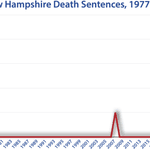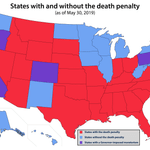
State & Federal
New Hampshire

Famous Capital Cases
Ruth Blay, executed in 1768, was the last woman executed in New Hampshire. She was accused of allegedly killing her stillborn child — a crime of which she was exonerated shortly after her execution. A play was made about her death and a popular song recognizing her innocence was sung locally in the Portsmouth area for many years.
Thomas Powers was executed in 1796 for rape. He was the only African American man ever executed in New Hampshire and the only person ever executed in NH for a crime other than murder.
Milestones in Abolition/Reinstatement
New Hampshire has executed 26 people in its history. The last execution was in 1939.
Howard Long was put to death in July of 1939. The rope used to hang him is still retained on display in the Belknap County Sheriff’s office.
A bill to abolish the death penalty was passed by the House and Senate in 2000. The bills were vetoed by Governor Jeanne Shaheen.
In 2004, as part of a national campaign to end the death penalty for juvenile offenders, a bill banning the execution of those convicted of killing while under the age of 18 passed the House and Senate. It was vetoed by Governor Craig Benson. The next year the same bill was reintroduced and passed again. It was signed by Governor John Lynch.
In 2009, an abolition bill passed the House and was then amended in the Senate to create a study commission on the death penalty. Governor Lynch signed that bill and the commission met for a year and issued a report in December 2010.
In April 2018, the House and Senate again voted to abolish the death penalty. Governor Chris Sununu vetoed the bill on June 21, 2018.
In 2019, the legislature again voted to abolish the death penalty, Governor Sununu vetoed the bill. On May 30, 2019, the legislature completed its repeal of the state’s death-penalty statute, voting to override the veto. The repeal was not retroactive, leaving one person on the state’s death row.
New Hampshire “Firsts”
For many years, New Hampshire had the most restrictive death penalty in the country. It applied only in cases of homicide or treason.
In 1834, New Hampshire’s Governor Badger was one of the nation’s first to call for abolition of the death penalty as part of the gallows movement.
Other Interesting Facts
New Hampshire still retains a narrow death penalty statute, which only applies in six specific circumstances.
New Hampshire does not currently have a death chamber. In 2010, the Department of Corrections estimated that building an execution chamber would cost about $1.7 million, but the legislature has not authorized funds to build it.

Resources

New Hampshire Execution Totals Since 1976
News & Developments
News
Mar 09, 2022
Renny Cushing, Victim-Advocate Who Led New Hampshire Death-Penalty Repeal Effort, Dies at 69
New Hampshire State Representative Robert“Renny” Cushing (pictured), a longtime victim-advocate who led the Granite State’s successful efforts to repeal the death penalty, died March 7, 2022 after a multi-year battle with…
Read MoreNews
Jul 03, 2019
New Podcast: New Hampshire Rep. Renny Cushing on Empowering Crime Survivors and Repealing the Death Penalty
“Being the survivor of a homicide victim has a pain for which there aren’t any words,” says New Hampshire Representative Renny Cushing (pictured), in the latest episode of the Death Penalty Information Center podcast, Discussions with DPIC. But “[f]illing another coffin doesn’t do anything to bring our loved ones back, it just widens the circle of pain. There’s a big difference between justice and vengeance,”…
Read MoreNews
May 30, 2019
New Hampshire Becomes 21st State to Abolish Death Penalty
Overriding a veto by Governor Chris Sununu, the New Hampshire legislature has repealed the state’s death-penalty statute. With a 16 – 8 supermajority, the May 30, 2019 vote of the New Hampshire Senate equaled the two-thirds required to override a gubernatorial veto. One week earlier, the state House had voted to override with a 247 – 123 supermajority. The override vote made New Hampshire the 21st state to abolish capital punishment and the ninth…
Read MoreNews
May 03, 2019
New Hampshire Governor Again Vetoes Bill to Repeal State’s Death Penalty
For the second time in as many years, New Hampshire Governor Chris Sununu (pictured, left) has vetoed a bill to repeal the state’s death penalty. Sununu’s action on May 3, 2019 sets the stage for an anticipated attempt later in the legislative session to override the Governor’s veto. A two-thirds vote in each house is…
Read MoreNews
Apr 12, 2019
New Hampshire Senate Passes Death-Penalty Repeal With Veto-Proof Majority
In a vote death-penalty opponents praised as“historic,” a veto-proof supermajority of the New Hampshire legislature gave final approval to a bill that would repeal the state’s death penalty statute. By a vote of 17 – 6, the senators voted on April 11, 2019 to end capital prosecutions in the Granite State, exceeding the two-thirds majority necessary to override an anticipated veto by Governor Chris Sununu. In March, the state House of Representatives…
Read More


